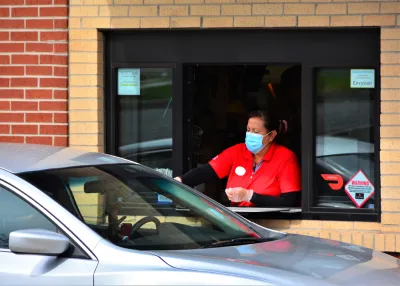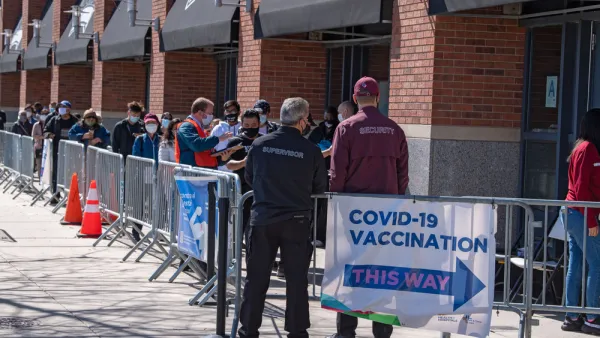The pandemic has created even more obstacles to participation in society for those without a car.

Madeline Brozen critiques the uses of drive-ins and drive-thrus as the chosen response for services during the pandemic, first noting how completely the concepts have caught on in an already car-centric country:
Given the convenience and privacy of the automobile, it is no surprise that drive-ins and drive-thrus have surged during COVID-19. This fall, people could traverse spooky Halloween drive-thru trails, visit drive-thru pet sanctuaries, and view entire independent film festivals from their cars. Governments and healthcare providers, meanwhile, are offering drive-thru food distribution, COVID-19 testing, and flu shots.
There's a big problem with the popularity of drive-ins and drive-thrus during the pandemic, according to Brozen: they're only available people that drive.
Without a car, you can’t see the elaborately carved pumpkins, smile at the rescue cow, or enjoy most outdoor movies. There are worse things, of course, than being denied access to a drive-thru burger, or to an Instagrammable haunted Halloween drive-thru. But it is much more concerning if you can’t get food from the food bank, or know if you have tested positive for COVID-19.
According to Brozen, the country already denies access to opportunity to those without automobiles, whether by choice or necessity, and the current trends would only strengthen those obstacles at the worst possible time. And like so many other consequences of auto dependency in the United States, both racial justice and social justice suffer as a result.
Brozen notes that the tendency toward driving-thru services during the pandemic is a set back for a growing movement in planning departments to slow the spread of auto-dependency by banning drive-thrus altogether. "Minneapolis, for example, prohibited the opening of new drive-thru facilities after 2019, saying they were inconsistent with the city’s long-term plans to reduce greenhouse gas emissions. A handful of other cities in California, Montana, and New Jersey have instituted their own temporary or permanent bans too," writes Brozen.
The source article offers a few policy prescriptions to ensure that drive-thrus and drive-ins don't exclude people without cars.
FULL STORY: Opinion: The Problem with Drive-In Services — Now and After COVID-19

Analysis: Cybertruck Fatality Rate Far Exceeds That of Ford Pinto
The Tesla Cybertruck was recalled seven times last year.

National Parks Layoffs Will Cause Communities to Lose Billions
Thousands of essential park workers were laid off this week, just before the busy spring break season.

Retro-silient?: America’s First “Eco-burb,” The Woodlands Turns 50
A master-planned community north of Houston offers lessons on green infrastructure and resilient design, but falls short of its founder’s lofty affordability and walkability goals.

Test News Post 1
This is a summary

Analysis: Cybertruck Fatality Rate Far Exceeds That of Ford Pinto
The Tesla Cybertruck was recalled seven times last year.

Test News Headline 46
Test for the image on the front page.
Urban Design for Planners 1: Software Tools
This six-course series explores essential urban design concepts using open source software and equips planners with the tools they need to participate fully in the urban design process.
Planning for Universal Design
Learn the tools for implementing Universal Design in planning regulations.
EMC Planning Group, Inc.
Planetizen
Planetizen
Mpact (formerly Rail~Volution)
Great Falls Development Authority, Inc.
HUDs Office of Policy Development and Research
NYU Wagner Graduate School of Public Service




























